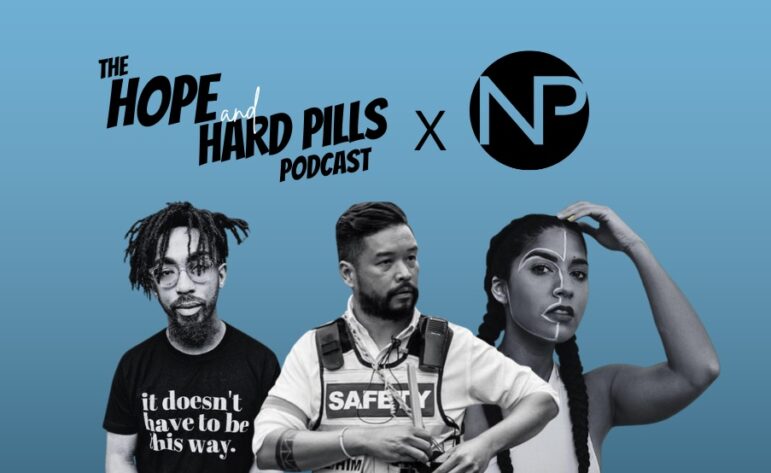Kalaya'an Mendoza Talks Nonviolence, Protest Safety, & Community Care on the Hope and Hard Pills Podcast
Recently, Kalaya'an Mendoza, Head of U.S. Programmes, sat down for an interview with Andre Henry and TRISHES, hosts of the Hope and Hard Pills Podcast— a show that furthers conversations around racial justice and social change. In this episode, Kalaya'an shares how to incorporate safety into direct action activism, while prioritizing marginalized communities and identities. Here are a few snippets from their conversation:
Nonviolence As Strategy
KALAYA’AN MENDOZA: The reason I gravitate towards nonviolence is because I'm a violent person. I have so much rage and it is something that I feel like is a gift that my ancestors have passed down to me. For me, it's about being strategic. How do we open up the space to have as many people as possible see themselves reflected in the work? How do we get rid of barriers of entry to make it as accessible to all community members?
Growing up in the [San Francisco] Bay Area, we studied the Black Panther Party and one of the narratives was like, 'oh, you know, the Black Panthers rolled around with guns.' Yes, and they had the free lunch program. They built out and met the immediate needs of the community in a way that was directly threatening to the status quo and the power structures at the time.
ANDRE HENRY: I think that people fetishize and romanticize the idea of using arms. I'm not morally against those movements, or of oppressed people that choose to do that, but not everyone can participate in that way.
Creating Safety with Black & Indigenous Feminism
KALAYA’AN MENDOZA: I saw this in Ferguson 10 years ago, Black aunties who were taking care of folks, who were making sure that people were being trained on how to decontaminate from tear gas and pepper spray.
At Standing Rock, I saw Lakota, Dakota, and Nakota relatives and leaders like LaDonna Brave Bull Allard really showing what it looks like to have a decolonized lens when it comes to safety. When it isn't about power over, but rather power with, and in the occupation of the Yamato in Aotearoa, New Zealand, I saw Maori organizers building safety at a protest site that was attacked by the police.
They still felt safe enough as a community to exist where kids were running around and still playing. There's something beautiful in that resistance of colonization, the colonization that still exists in saying and rematriating our approaches to safety that are grounded in Black and Indigenous feminisms.
We Can't Have Privileged Folks Dictating Strategy
KALAYA’AN MENDOZA: In 2008, I was part of a group of folks that went to Beijing during the 2008 Beijing Olympics. My team and I, we were beaten, detained. I had my foot broken, my back injured, and we were interrogated and put into solitary for 24 hours. And the learning from that was, how do we actually build informed consent in our movement work for folks to be able to opt in or opt out of direct actions?
Because for folks that come from marginalized identities, we can't have privileged folks dictating what the strategy looks like. Incorporating safety into the strategy, can't be an afterthought, it needs to be woven in. Because if we're building a safer, more just and verdant world, it can't just happen at the end of the planning process.

